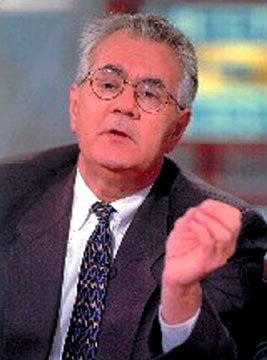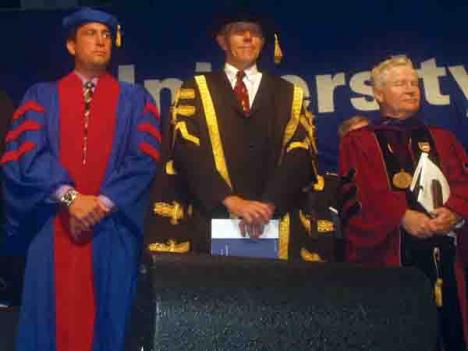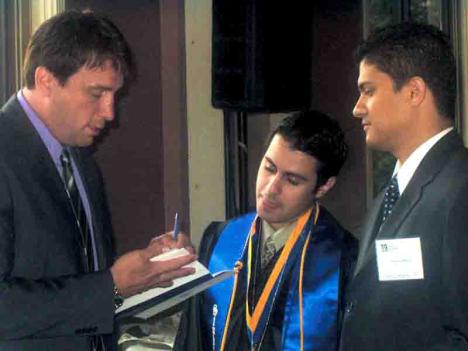Congressman Barney Frank Speaks at UMass

February 26, 2003
Barney Frank returned to UMass Boston, this time as Massachusetts representative to the Fourth Congressional District for the U.S. House of Representatives, offering upfront insight and candid comment on the current political climate.
Mr. Frank, who taught at UMass Boston in the late 70’s, criticized President George Bush’s “conservative, Reaganite foreign policy,” and called the Bush administration “dishonest.”
Chancellor Jo Ann Gora introduced Mr. Frank, stating that, “Since he was elected, Barney Frank has been one of the most eloquent and insistent voices for those whose voices often aren’t heard. And his issues are our issues. He has been a passionate voice for human services, for access to health care, the elderly, for housing, the support for education, and especially his support for the veterans, for the neighborhoods and for our environment. We are very pleased to have him here today.
“It seems fitting that the Joiner Center should be sponsoring this event, for the young men and women who may be fighting this war that may lay before us will be young men and women from neighborhoods like those we serve. Some will probably even be our students. We hope that this war will not happen,” she said. “If it does, we know that leaders like Barney Frank will be there to make sure that there are programs for our veterans and programs to restore normal life in Iraq. We know he will be there fighting for them just as he fought for them in Afghanistan.”
“I think they [the Bush administration] are being dishonest about the rationales for the two major enterprises of this administration,” started Mr. Frank. “There are some side things they are doing, but the essence of this administration actually is a kind of pioneering example of a new economics: two wars and three tax cuts. It’s really quite extraordinary.
“Their argument for the latest tax cut is that it’ll stimulate the economy, because of the recession. Their argument for going to war and overthrowing Saddam Hussein is that we must put an end to a threat to us. I don’t think either one is true, and, moreover, I don’t think they believe either one,” said the ranking member on the House Financial Services Committee, and newly appointed to the Select Committee on Homeland Security. Mr. Frank accused the Bush administration of using the slow growth period as an excuse to cut taxes.
“People should understand that George Bush here is not his father’s heir, he’s Ronald Reagan’s heir. He goes back to the Reagan Administration, and the tax-cutting year is the same as the Reagan Administration,” he said, suggesting that everyone go and read The Triumph of Politics: Why The Reagan Revolution Failed, written by David Stockman, former President Reagan’s first-term director of the Office of Management and Budget. “The Reagan rationale was, if we cut taxes, we’ll wind up with more revenue in the end because this will promote more economic growth. [Federal Reserve Chairman] Alan Greenspan said, by the way, last week, among other things, that he had never seen that happen. That while it was theoretically possible, he could not think of a tax cut that had that result. Didn’t get a lot of attention, but we remembered it.
“I don’t believe they think Iraq is a threat,” said Mr. Frank, who was one of the few who had voted against President Bush’s congressional resolution to wage war against Iraq. “In the first place, the Pentagon itself, by the way, in their war planning, has said a very significant factor that doesn’t get enough attention in this context. Mainly, that the Iraqi military has about one-third the strength it had in 1991. Well, the 1991 the war didn’t last very long. We’re talking about a military one-third as powerful.
“Their capacity to threaten us or anybody else has been substantially diminished,” he said. “Contrary to what the administration is saying, the choice is not war or nothing. Saddam Hussein is a very bad man who has done bad things, and if he was left to his own devices, would do more bad things. The question is are there ways to restrain him, prevent him from doing bad things without going to war. The answer is, of course there are.
“They don’t believe that Saddam is a threat in the military sense. We found those missiles, that he had, that he lied about…they had a range of twelve miles. That’s not anything that threatens, unfortunately or fortunately, anybody other than his own people.”
Mr. Frank later took questions from the small crowd. One person asked to what extent oil was an issue. It’s not about oil, Mr. Frank replied, but about foreign policy, pointing out that Afghanistan did not have oil.
“Demonstrations do not, in and of themselves, effect elected officials,” said Mr. Frank, a congressman since 1981. “Because there could be a million people outside, [but] who knows who they are, who knows whose district they’re in. Demonstrations are useful if they energize people, and are used to energize people to then take the more effective political action: writing letters and calling.
“Pound for pound, person for person, what would you say is the most effective political lobbying group in America?” he asked.
“NRA (National Rifle Association)” the crowd said.
“When’s the last NRA march you saw?” said Mr. Frank, drawing laughter. “Have any of you heard of an NRA demonstration? I have not. And you understand how effective they are. That’s because they call and they write and they lobby.”
The event, held in the Chancellor’s Conference Room in the Quinn Building, was sponsored by the William Joiner Center for the Study of War and Social Consequences, and co-sponsored by the John W. McCormack Institute of Public Affairs, the Sociology Department of UMass Boston, the UMass Student Veterans Center, and the College of Public and Community Service.






















































